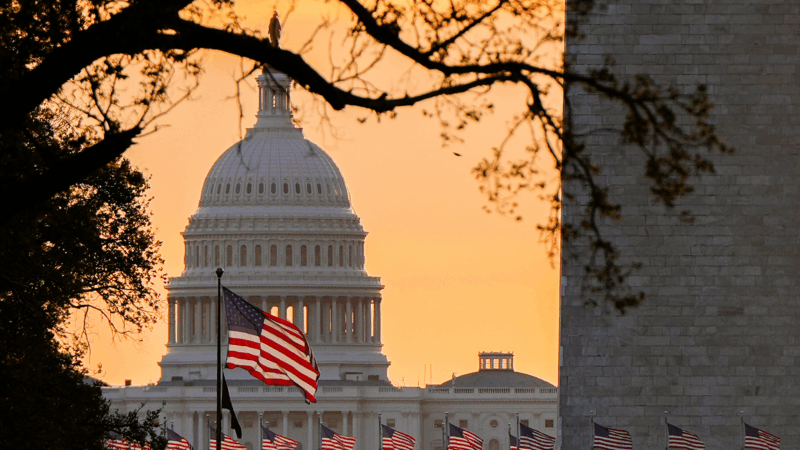What will Congress do after the shutdown? We asked a Republican and a Democrat
Most of the federal government is shut down after Senate Republicans and Democrats failed to reach a funding agreement to keep it open.
Democrats wanted to extend Affordable Care Act (ACA) subsidies used to make health insurance premiums more affordable for millions, but Republicans said they wanted to discuss extending the credits after reaching an agreement to fund the government. Democrats also wanted to repeal cuts made to healthcare programs by President Trump’s signature legislation — the One Big Beautiful Bill Act.
Trump has blamed Democrats for the shutdown and said last week he would look for a way to do a “reduction in force” of federal workers in the event the government closed.
So where does Congress go from here? Morning Edition‘s Leila Fadel spoke to two House members — Democrat Rosa DeLauro of Connecticut and Republican Mike Haridopolos of Florida — to get a sense.
Here’s what they had to say.
Haridopolos hopes more Democrats will come around to support re-opening the government

On Tuesday night, Democratic Sens. John Fetterman of Pennsylvania and Catherine Cortez Masto of Nevada — as well as independent Angus King of Maine, who caucuses with Democrats — voted for a Republican-backed plan in the Senate that would have kept the government open for seven weeks.
Haridopolos blamed Democrats for shutting down the government, but said he was “encouraged” by the three Democratic votes Republicans got.
“This is not the final negotiation. This is a seven-week, what we call stopgap, so that workers aren’t furloughed,” Haridopolos said. “We want them to keep working because not just to get paid, but more importantly, provide the services that people have paid for as taxpayers.”
Haridopolos added that he understands the politics of the moment, but said it is a “win-win” situation to keep the government open and that healthcare negotiations can be had later as both House Speaker Mike Johnson and Senate Majority Leader John Thune have said.
Haridopolos said negotiating will be a “give and take process,” but he noted that Trump campaigned “on the idea that we have a big budget deficit and we need to bring the spending in line with what revenues come in.”
You can listen to Haridopolos’ full interview here.
DeLauro says Democrats don’t trust Republicans will actually negotiate

DeLauro, the ranking member on the House Appropriations Committee, said negotiating with Republicans “sounds wonderful.”
She added, however, that after seeing President Trump attempt to reshape the federal government through Elon Musk’s DOGE and freeze funds appropriated by Congress through its constitutionally delegated power of the purse, there is no “trust factor” between the two parties.
She also noted Russell Vought, Director of the U.S. Office of Management and Budget, saying earlier this year that “the appropriations process has to be less bipartisan” as a reason why trust has broken down.
“If you trust what they say they’re going to do, I’ve got a bridge that I’m going to sell you,” DeLauro said.
Democrats will focus on the impact healthcare spending cuts could have on the U.S. public, DeLauro said. Spending reductions made to Medicaid and ACA marketplaces through Trump’s signature bill are expected to cause about 12 million people to lose insurance by 2034, according to Congressional Budget Office estimates.
“What we need to do is to make sure that the cuts are no longer there, that we address the cost of living and we save healthcare for the American people,” DeLauro said. “That is what’s on the line. That’s what Democrats are prepared to do.”
You can listen to DeLauro’s full interview here.
This digital article was edited by Treye Green.
Homeland Security suspends TSA PreCheck and Global Entry airport security programs
The U.S. Department of Homeland Security is suspending the TSA PreCheck and Global Entry airport security programs as a partial government shutdown continues.
FCC calls for more ‘patriotic, pro-America’ programming in runup to 250th anniversary
The "Pledge America Campaign" urges broadcasters to focus on programming that highlights "the historic accomplishments of this great nation from our founding through the Trump Administration today."
NASA’s Artemis II lunar mission may not launch in March after all
NASA says an "interrupted flow" of helium to the rocket system could require a rollback to the Vehicle Assembly Building. If it happens, NASA says the launch to the moon would be delayed until April.
Mississippi health system shuts down clinics statewide after ransomware attack
The attack was launched on Thursday and prompted hospital officials to close all of its 35 clinics across the state.
Blizzard conditions and high winds forecast for NYC, East coast
The winter storm is expected to bring blizzard conditions and possibly up to 2 feet of snow in New York City.
Norway’s Johannes Klæbo is new Winter Olympics king
Johannes Klaebo won all six cross-country skiing events at this year's Winter Olympics, the surpassing Eric Heiden's five golds in 1980.







